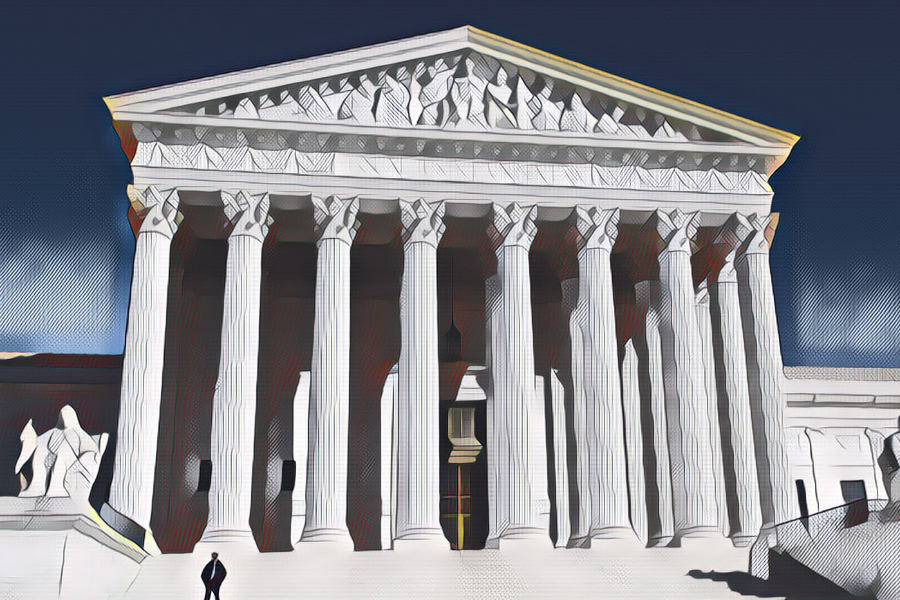As federal COVID-19 vaccine mandates head to U.S. Supreme Court for fast-track review, poll shows Americans have nuanced views of religious exemptions

The U.S. Supreme Court set a speedy briefing schedule and a January 7 oral argument to address emergency requests to halt enforcement, while litigation is pending, of a pair of federal rules related to COVID-19 vaccination requirements: 1) the Occupational Safety and Health Administration’s (OSHA) vaccinate-or-test mandate for businesses with 100+ employees; and 2) the Department of Health and Human Services (HHS) requirement that all health care workers at facilities receiving Medicare or Medicaid funding must be fully vaccinated unless they are granted a medical or religious exemption.
Petitions were filed quickly after the 6th U.S. Circuit Court of Appeals dissolved a stay and allowed the mandate to go forward while the cases continue. Although several religious institutions also filed emergency requests in response to the 6th Circuit’s ruling, theirs were not among the petitions set for hearing before the Supreme Court in January. That suggests that the Court will likely focus on whether OSHA exceeded its authority under the law, rather than constitutional questions about whether its rules extend to religious employers, and whether the vaccine-or-test mandate runs afoul of religious liberty interests. For its part, the 6th Circuit dispensed with the religious liberty arguments against the OSHA rule in a footnote to its opinion:
The [rule] states, “if the vaccination, and/or testing for COVID-19, and/or wearing a face covering conflicts with a sincerely held religious belief, practice or observance, a worker may be entitled to a reasonable accommodation.” Therefore, Petitioners are unlikely to succeed on their argument that the [rule] infringes on religious liberty. Regardless, their circumstance-specific arguments are premature…
The Supreme Court has previously declined petitions raising religious liberty objections to state COVID-19 vaccine mandates directed at health care workers. The arguments slated for January 7, by contrast, concern the rule-making authority of federal agencies.
As for religious exemption requests generally, a new poll suggests that Americans have a nuanced understanding. The nationwide survey, conducted by the Public Religion Research Institute and Interfaith Youth Core, finds that only 39% of Americans support a blanket religious exemption for all who claim one.
What does the majority believe? Robert P. Jones of PRRI and Eboo Patel of IFYC explain in an opinion piece for Religion News Service:
Solid majorities, however, favor granting a religious exemption if the person has a verified history of refusing other vaccines on religious grounds (55%), or if the person belongs to a religious group with a record of refusing other vaccines on religious grounds (57%). Notably, belonging to a religious group with a record of refusing other vaccines is the only criteria for granting a religious exemption that finds majority agreement across all major religious groups.
For most Americans, then, the legitimacy of religious objections to COVID-19 vaccination mandates rests on how consistent the current claim is with a person’s previous actions. If, for example, a person identifies with a religious group with a consistent history of asserting religious exemptions to vaccines and other modern medicine, and has opted out of other vaccines for themselves and their children, most Americans see that claim as legitimate. But Americans look more askance at a religious objection from, say, a Southern Baptist, a member of a denomination with no history of vaccination objections, who has previously consented to the typical vaccination regimen for their kids.
For more on the intersection of vaccine mandates and religious liberty, check out Season 3, episode 3 of BJC’s essential podcast, Respecting Religion. BJC General Counsel Holly Hollman and Executive Director Amanda Tyler discuss the issue with clarity and detail. I highly recommend it!
UPDATE: An earlier version of this article contained a quote from the Religion News Service piece that inaccurately implied that Jehovah’s Witness beliefs prevent members of the tradition from being vaccinated. We have updated the quote here to match the update in the original piece.




